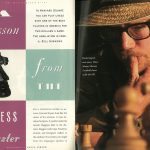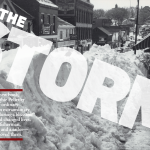About Our Hard Cider — And, Yes, Our Hard Tea, Too
Jud’s New England Journal For September 2012 Welcome to the September 2012 edition of Jud’s New England Journal, the rather curious monthly musings of Judson Hale, the Editor-in-Chief of Yankee Magazine, published since 1935 in Dublin, N.H About Our Hard Cider – And, Yes, Our Hard Tea, Too It’s difficult for outsiders to believe how […]
Welcome to the September 2012 edition of Jud’s New England Journal, the rather curious monthly musings of Judson Hale, the Editor-in-Chief of Yankee Magazine, published since 1935 in Dublin, N.H
About Our Hard Cider – And, Yes, Our Hard Tea, Too
It’s difficult for outsiders to believe how strong New Englanders prefer both…
While various spirits are widely consumed throughout New England today, the traditional drink is, of course, cider. Hard cider. Sure, there’s always been plenty of sweet cider handy, particularly during the fall months, but during my growing-up years in Vanceboro, Maine, the favorite recipes had names such as “Hard Cider Egg-Nog”, “Old Hard”, and “Whitcomb’s Dynamite Special.” The latter, in a 19th century recipe book I still keep in my office today, is described with the following postscript:
“Don’t ever venture to drink it. It’s great for blasting rocks or blowing out stumps. If you owe somebody a grudge, a slug of ‘Whitcomb’s Dynamite Special’ will square accounts permanently.”
An old New England custom was to take barrels of cider and bury them in the ground in the fall. Then in the spring, the barrels were dug up and the contents put through some sort of filter, after which the cider would be, as an oldtimer once told me, “clear as wine, with a kick that would put a mule to shame.” The holes were called cider holes and the result was generally known as applejack, which has a “muzzle velocity”, as the oldtimer told me, “like a six-inch howitzer cannon.”
Tea, more popular in New England than in any other part of the country (or so I’ve been lead to believe), is written and talked about in the same exaggerated manner as is hard cider. We just seem to enjoy boasting about how incredibly strong our drinks are.
“Laboratory tests have proved that tea prepared in the Maine fashion is far more corrosive than nitric acid and only misses being the universal solvent by an eyelash,” wrote one Down East newspaper columnist some years ago. And he was only half joking.
“To be at its best, Maine tea should be prepared out of doors,” he went on to say, “in a pot made of double-thick armor plate. A pound of tea in a tablespoon of water is the ration generally observed in mixing the ingredients. This mixture is boiled for two days or until the foliage within a radius of three miles has been withered by the strong fumes it gives off.”
Roger Finn recalls a time when the Finn School in Concord, Massachusetts, had its beginnings. One day a Miss Jay was reading a story to the first graders and came upon the word “straight.” She paused for a minute to establish the meaning of it. Some told her that the edge of the table was straight. Others chose a ruler. There seemed to be complete understanding by all until, inevitably, a little boy by the name of Sammy, age six, said, “No, that’s not what it means. In my house it means, ‘without gingerale.’ ”
Spoken like a true New Englander. You’ve heard that one before? Well, sure…but I like the old stories!







